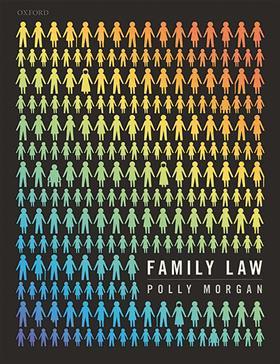Family Law
Polly Morgan
£38.99, Oxford University Press
★★★★✩
Having just reviewed Bromley’s Family Law, I was interested to see how another textbook on the same topic would compare. Polly Morgan’s work is very different.
The publicity material describes this work as a ‘clearly structured, paced, and guiding narrative through all the required material of an undergraduate course, married with rigorous academic analysis and examination of the law’. While this book may be primarily targeted at the undergraduate, there is a good deal in it for the busy family law practitioner. This may be because the author, while an associate professor at the University of East Anglia, spent a decade in legal practice as a family law solicitor, and co-founded her own law firm.
The way this book works is best shown through example. Take the chapter entitled Private Law Decisions about Children. It starts with a reading checklist, setting out what the reader should be able to do by the end of the chapter. So, for example, the reader should be equipped to discuss the different types of contact, and critically discuss the research on shared parenting time. There follow four scenarios of different families, including one with a baby, another with a child conceived through donor sperm, another where there is domestic violence. These are revisited throughout the chapter as the text develops.

The chapter is punctuated by at-a-glance tables, key cases and statutory extracts. Thus the first table is about who can apply for a section 8 Children Act order. One key case is Mabon v Mabon [2005] EWCA Civ 634 on children applying for leave to become parties to section 8 proceedings. Another is Re LVMH (Contact Domestic Violence) [2000] 2FLR 334 (CA). Then we find the section 1(3) welfare checklist and Article 8 ECHR as some of the statutory extracts. In addition, there are knowhow sections on Cafcass and what a child arrangements order may look like. There are then several ‘Focus – Think Critically’ boxes, which cover the likes of gender bias, and how common are breaches of section 8 orders.
The chapter is then wrapped up with a page of key points and another of further reading suggestions. An e-book, which has online resources where one can watch a video of the author discussing the chapter topic, is also available. The reader can also test their understanding of the chapter with self-test questions and scenario questions. An additional online chapter, Elderly Care, has just been added.
The work is as up to date as can be with a section on no-fault divorce, introduced by the Divorce, Dissolution and Separation Act 2020.
Domestic abuse is well covered in its own chapter, with a section on the Domestic Abuse Act 2021, and, interestingly, a graphic on its economic and social costs.
All in all, a very useful book.
Tony Roe is a family law solicitor and arbitrator at Dexter Montague LLP































No comments yet